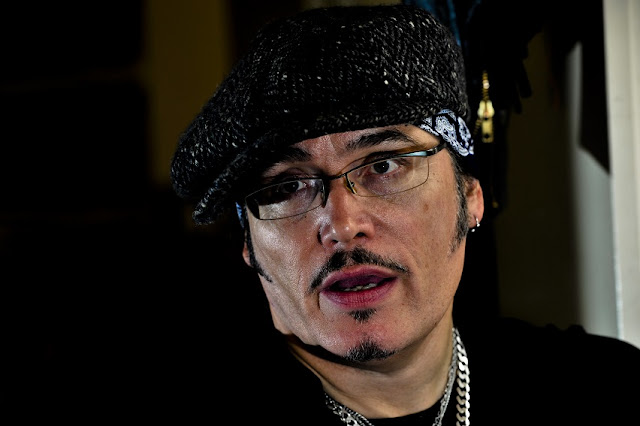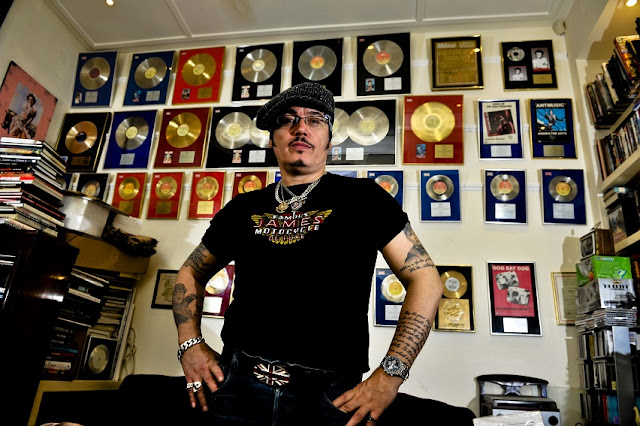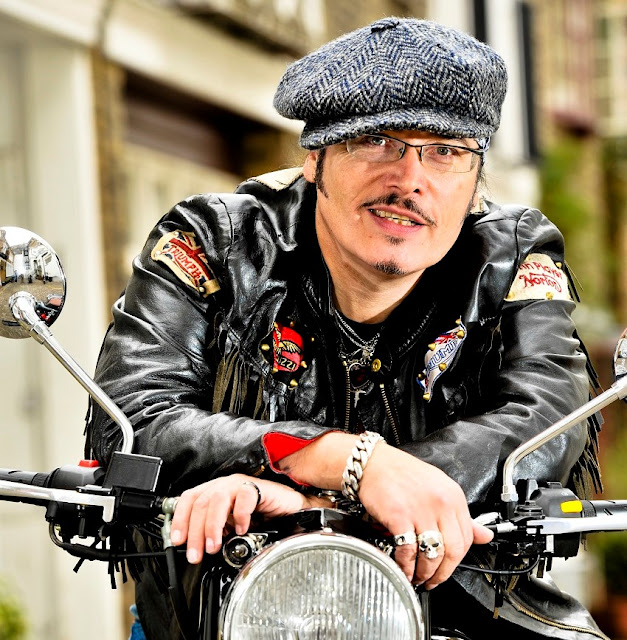We’ve heard a lot about the Blueblack Hussar album. What’s been causing the delays in its release?
It's a small label, my own label, so once you've recorded it you've got to get the investment together. I don't want to be with a big record label - I don't want to get into that again. So, basically, I'm just manufacturing it and distributing it through a partner and that's taken a bit of time. But it's all finished and ready to go. It's a double album and will be available as a CD and as a download, but we're really going to push the vinyl release. The band's in place and we're ready to rock.
You're favouring your earlier
material in the current live shows. Is that because it translates better to
live performances or because that's the material you're most proud of?
The stuff that suits being played live best is the earlier stuff - the first four albums really: Dirk, Kings, Prince Charming, a bit of Goody Two Shoes, maybe some Vive le Rock too. So, really, it's just choosing my favourite songs from all the different eras that actually work well with a live band. I don't do samples, it's all 100% live. Having said that, it's quite hard to do things like Puss 'n Boots and Strip live, so we have to do them really stripped down. We know about 35 songs, so we change the set around quite a lot. But I think that, coming back after 17 years, you've got to play what people want to hear and what I want to play. And I'm always trying to get the songs right when I play them live now. A lot of these songs were created in the studio, so on tracks like Dog Eat Dog or Kings of the Wild Frontier, there were, like 18 drum tracks on there and we only have two drummers to try and re-create that sound live. But I've got two great drummers; they're like a machine, they really link up well together. So, any time I play those songs live a) I really enjoy them and b) they really sound great the way they're being played now.
What was the turning point in your decision to start
performing again?
Well, it's what I do, really. I've never stopped wanting to write songs; that's my favourite thing, writing the songs and performing them. As a singer, your job is to sing, but now I'm able to play a bit more guitar now - but with the Ants it was quite difficult because only one of them could sing and, with any one of my songs, half of its vocals. Out of the six people in my current band, five of them sing, so I now have the great luxury of just singing the lead vocal. So, I've got an incredible amount of freedom that I never had before, and I'm focusing on getting better as a singer, but I get to play a bit of guitar too, which I love doing. So that, for me, is two very exciting things that I wanted to pursue, and to get the songs sounding as best they can up against the original recordings - I want to replicate the original sound of the songs without resorting to sampling or cheating, because I think sampling is cheating. So, the songs we're playing now were chosen because they do suit a live band, and my extra bit of guitar helps in filling out the sound. So, I'm having a ball with it, really, and I'm very grateful to be around to do it because I've been through a few ups and downs. When you're with a major record label you're doing album, tour, album, tour relentlessly, and you realise that you're not the one pulling the strings. So now when I do a concert, I know exactly how much I'm getting for it, I know what I'm doing, I co-promote them, and I don’t work for anybody - I work with people but I don't work for anybody at all. With an independent label, there's a lot more responsibility that comes with it.
Do you write songs on your first instrument, the bass, or
on a six string?
Six string.
You’re headlining the Silverstone Classic in July. How
did that come about?
People just phone up and ask if we'll do an event and we either say yes or no. The plan at the moment is to do quite a big UK tour around the album towards the end of the year. I played Australia in March/April and I'll be doing a tour in America in September/October. I haven't been to Australia since I toured with the Ants in 1981. I had a lot of hits out there, but I was signed to UK Sony, so they tended to keep us in Europe. Even when we should have been in America, we were in Europe. It's actually quite nice to be going back because I had a lot of success there and then I sort of went away, but it's coming back now, because the people in the media over there grew up listening to my music so they seem really enthusiastic about it.
Why was the American tour postponed until later in the
year?
I just want to be able to go out there and play the new album instead of just playing all the old stuff. And we had a few issues with some of the venues not being right.
Will the Silverstone show be harder because you're not
playing to a die-hard Ant audience?
That doesn't bother me. I'll just do the show. To me, any venue is a room, it doesn't matter where it is. It could be a club, a backroom, or a stadium. I played with Rod Stewart and Stevie Nicks to 40,000 people last year and that wasn't my audience either, but we had a good go. If someone hires me then I'll go and do my show. Consistency's the thing you're after, so I never think “Oh, this is gonna be tough.” You just go out and play.
Do you miss writing with Marco Pirroni?
Well, Marco's got his own band now, The Wolfmen. I think we'd just been together for a long, long time and it kind of wore itself out really. I was quite interested in working with some other people. Boz Boorer's (ex-Polecats and Morrissey's right-hand man) written some stuff with me for the new album and so has Chris McCormack (formerly of 3 Colours Red) and the rest I wrote myself. I'm a bit more interested in the production now and getting behind the scenes and, also, if I like a band, I'll sign them up, put them out on the road, and get a record out. I've been storyboarding a new video and I'm going to direct that too. So, there are other things that are exciting to me, as well as making the music, but the music always comes first: the songs have got to be there first and then everything else is just drawing on things that interest me anyway. But, instead of being under the pressure of a major record label always restricting things, you can actually do it yourself and the buck stops with you.
Your current band sounds
really tight after so many gigs of late. Is this the best that Adam Ant has
ever sounded?
I started playing again about 18 months ago, just acoustically, stripping the songs that I'd written right down to the bare bones so they could be played just on one guitar. Then I taught the band the way I'd written them and then just played as many places as I could play. We've played to around 150,000 people in the last year - that's a lot of people to play to. I'm just going out there and taking it back to the basics. I did get offered a big-money gig at the O2, a bit like the Spandau Ballet boys did several years ago, but I didn't feel happy about just going in and doing the one show, because where do you go from there? I just didn't feel comfortable with it. Performing is a craft and you need to work up to the stamina it takes to do a two-hour show like I'm doing now. And it takes time to build a great band; the band I have now is so committed; they're all young, they're fresh, and we're not being told to go here and there by a record label “Don't do that, do this.” I do what I want to do now.
Does that mean you would reconsider
the O2 gig now that you and the band are ready?
Well, I could do it. I mean, hopefully one day I could play a place of that sort of scale, but the time would have to be right, you know, when I had brought things back to that sort of level. But the most important thing for me right now is to bring out a new record which is what I'm doing. That, for me, has always been what it's all about. I've been offered a lot of money just to do the Eighties tours and the whole retro thing, but I've steered clear of all that because I don' t really want to get involved. But I'm very proud of my back catalogue and if I went to see Roxy Music or someone that I'd grown up with, I'd want to hear the hits. I do one song from the new album - Vince Taylor - in the live show, but if you go and see The Stones, they play their classic tracks. If you've been around that long, then you do have the advantage of having about ten albums of material to choose from so you can change the set from night to night and throw a few surprises in.
When did you decide to break
with the ‘don’t drink, don’t smoke’ philosophy and start smoking and drinking?
I don't know with the smoking. I just woke up one day and thought...well, I didn't smoke or drink and I've never done any drugs, cos I didn't think you should. Muhammed Ali was my hero and I thought “Well, sportsmen don't drink” and there was just so much of all those things available that it was kind of a nice discipline not to do any of it. But then I just thought one day, “Well, let's have a lager and a smoke.”
You seem to have done more
festivals this last year than you ever did back in the day. Do you enjoy them?
I never did any festivals with Adam and the Ants. But I like them. I did four last year - Latitude, Voewood, West Dean, and Hard Rock Calling - and they were great. Nice young audiences that perhaps haven't heard you before, but they'll give it a go and I like that.
Is there a danger it could
become too much work?
No, not really. The promotional side of it is pretty straightforward. It would seem to be hard on the surface, but I've always been in control of the visual side of it because I'm a graphic designer anyway, so I love doing that. So, once you've got the look of it right and you've got the logos sorted out and you kinda know how you want it all to be, and the title of it, then you kind of just collaborate with the best people around. The first tour I did was with Live Nation (in 2011) and I learned a lot from that. Coming out of that I found I had certain reservations about the way they work. But I learned a lot, and it's just really about putting your money where your mouth is: you co-promote the shows, put them on, sell them out, and get on with it. It's a risk-taking thing, but it's a small, tight-knit group of people I'm involved with. I like working with independent promoters who are keen to get into the business and work with established artists - they work really hard. I suppose it's the difference between an independent record label and a major label. I think there's a kind of in-between; if you've got a label like mine, you can try and get a bit of private investment to do it as they would do it, but you've also got your hands on the purse string, so you can make sure everyone gets a good return for their investment. And that's the difference now - I won't be rushed, and I won't put the album out until it's going to be visible. If you look at the music industry at the moment, the singles charts are all just R&B. With the album charts, you've always got a shot but it's not about the charts for me anymore, it's just about making a record that I want to make. It's going to be a double album. Everything I'm doing is the opposite of what people tell me to do, so I know I'm doing something right.
Are you on any medication now?
No. After a long period of being on medication, I went to my GP and said “Look, do I have to be on these for the rest of my life?” and he said “Well, it's your life, you make your own decision. You can try without them.” So, with very careful guidance, over a period of about six months, we gradually cut them out and I found that I could function without them. There are many other methods of dealing with mental illness that involve just a bit more work from the patient - things like getting up and getting out in the fresh air every morning. I think work is a very good therapy too, and I've got very good people around me now, and I've learned to say no to things I don't want to do.
How much of your creativity do
you think has been down to your medical condition? Does it allow you to see
things differently from most people? Would there have been an Adam Ant without
your bipolar disorder?
No, not really. I mean, bipolar disorder is up and down, black or white, and the mood swings are to varying degrees. The business that I'm in is highly competitive and you're pretty much a loner, and you take so much responsibility on that you only need two or three things to go wrong during a period of time and you're in a crisis situation. The thing is that you don't acknowledge or realise that, and you just keep going. And I just worked my way to the point where I couldn't see the wood for the trees. I just kept working when, really, someone should have said “Have a holiday!” Having said that, it's a very personal thing. There's a lot of ignorance surrounding bipolar disorder, a lot of taboo and fear, and it's vilified by society. So, I'm working with the SANE charity organisation on their Black Dog campaign and talking with them about doing some kind of documentary. In some ways it comes with the territory of being a performer because you're getting the rewards. The public are interested in people in the media, so if your experience can make someone else feel that there's hope, and that they can function, then that's got to be worthwhile. I think there's always room for alternative methods and techniques for maintaining stability in life. Filling people full of medication often isn't the way to do it. It works for some people but not for others. Medication's always there if you need it, but I seem to be doing quite well without it at the moment.
What else have you got planned
for 2012 and beyond?
Well, I just want to play rock
'n' roll and get the new record out - that's the priority at the moment.
Nothing is more important than that. I haven't done that for 17 years, so I've
got 17 years to make up for. I'm really grateful to have a band like I've got,
to have a record that I feel good about, and to have the repertoire to play.
And the audience is such a wide spectrum now; I'm constantly surprised by the
kind of people I see in the audience. And, like I say, it's great to just get
out there and do it, it's a great way of making a living and I'm just very
happy. I went to see Tony Bennett recently, and the guy's like 85 years old,
and he's singing better now than ever. So, to aspire to be doing that when
you're an old guy is great. I'd love to be still making music at his age. Music
is still my priority, I did do some acting because it was something that
intrigued me, and I did immerse myself in it for five years doing plays and TV
and some movies. It's another string to the bow, but the actual buzz I
personally get when I'm on stage, or when I'm writing a song, you can't compare
it. Nothing compares with that for me. So, I'm just happy to do that and not
neglect it, because I feel that if you don't try other things - in my case,
acting - then you'll always regret not trying them, but you have to go with
what feels right for you and what gives you the most pleasure, and it's
certainly music for me. And I have a 13-year-old daughter, so I have
responsibilities there and I've got to bring home the bacon!









Comments
Post a Comment